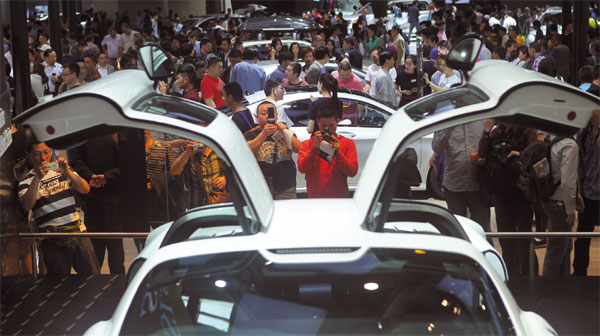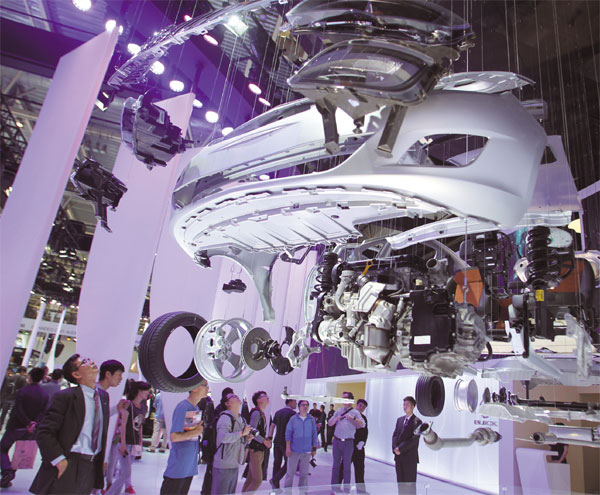Slower, but still top gear
Decelerating market growth has not punctured most automakers' plans for expansion in China
China remains a magnet for global carmakers, despite a slowdown in the world's top vehicle market as a result of the country's "new normal" of economic growth.
This is explicitly reflected by their ardor for the 16th Shanghai International Automobile Industry Exhibition which opens to the media on Monday.
The biennial auto gala, with the theme of "innovation for upgrading", has wooed nearly 2,000 carmakers and auto parts producers from 18 countries and regions this year.
With a total exhibition area of 350,000 square meters, a record number of 1,343 automobiles are competing to catch the eyes of Chinese buyers, up from the 1,134 on show in Beijing last year. Among these models, there are 109 vehicles making their global premieres.
Market slowdown
China's auto market is widely forecast to decelerate in the years to come due to the country's "new normal" of economic development which features slower but better quality growth.
Dong Yang, vice-president of the China Association of Automobile Manufacturers, said the auto industry is also entering a "new normal" and the auto market's rate of growth will be slower this year than last year.
Last year, 23.49 million vehicles were sold in China, up 6.86 percent on the year before.
In the first quarter of this year, vehicle sales edged up by 3.90 percent to 6.15 million units, according to data from the auto association.
Xu Changming, a senior auto analyst with the State Information Center, said the era of "explosive growth" in China's auto market has ended due to the changes in the country's economic development.
Xu predicted the auto market in China will grow by 5 to 6 percent annually on average over the next five years with passenger car sales growing at a faster rate of 8 to 10 percent.
Carmakers have begun to adapt to the deceleration.
Norbert Reithofer, chairman and CEO of German premium carmaker BMW AG, said last month that the Chinese auto market is "losing steam" and will slow to a more normal pace as a result of the country's economic slowdown.
Rupert Stadler, chairman and CEO of Audi AG, recently told China Daily that the company had foreseen the "new normal" of the Chinese economy two or three years ago and that it would decelerate the vehicle market.
Audi is shifting its top priority in China from sales volume to delivering higher quality and more environmentally friendly products, according to Stadler.
Jochem Heizmann, president and CEO of Volkswagen Group China, predicted in February that China's passenger vehicle market would grow by 5 to 8 percent this year, down from 13 percent last year.
Last month, the Chinese government cut its 2015 economic growth target to 7 percent from 7.5 percent last year.
The economy grew by 7 percent in the first quarter of this year from a year ago. This is the lowest growth rate in the past six years.
Continuous expansion
Yet despite the slowing market, carmakers seem to have no hesitation in further expanding in China, which has been the biggest single market for almost all of them.
The most aggressive move comes from Volkswagen, which revealed a plan in February to invest 22 billion euros ($23.22 billion) in China from 2015 to 2019 on new production capacity, products and research and development. Volkswagen, the biggest passenger car provider in China, plans to grow its annual production capacity in the country to 5 million units in 2019, up from 3.1 million units in 2013.
The company, together with its affiliate brands, such as Audi and Skoda, plans to introduce more than 30 new models in China this year, both imported and domestically produced.
The group's China sales grew by 12.4 percent to 3.68 million vehicles last year, accounting for 37 percent of its global deliveries.
US automaker General Motors last year announced it plan to invest $14 billion in China from 2014 to 2018 to build five new plants and introduce 60 new models, including nine SUVs.
It also plans to boost its annual production capacity in China to 5 million units in the period.
Toyota Motor, the world's top carmaker which is being closely chased by Volkswagen, reportedly plans to build two new plants in China with a combined production capacity of more than 200,000 cars a year.
The Japanese carmaker suspended its new plant plan in China in 2012 due to sluggish sales in this market.
South Korea's Hyundai Motor last month started building a new 300,000-unit plant in Cangzhou in the north of China, which will be operational in 2016. It is also planning another 300,000-unit factory in Chongqing in the southwest.
"Although the pace is slowing, the absolute growth volume in China's auto market will still be considerable compared with other major markets. And it is a very critical battlefield for all carmakers," said Xu Changming from the State Information Center.
"Therefore, all carmakers will continue to explore the Chinese market with new investment. Of course, some of them will be a little prudent due to the market deceleration."
BMW's Reithofer said that slower economic growth will affect the auto industry in China and the company will continue to consider this in its strategic planning.
But the company said it will further its localization in China by producing six BMW models "specially" for the Chinese market in the coming years. It now has three locally made models in China, including the 5 Series, 3 Series and X1.
Overcapacity concerns
There is evidence of growing overcapacity in China's auto industry with the expansion plans of foreign and domestic producers, as well as the market slowdown.
According to the auto association, automakers will have a total capacity to make around 400 million vehicles in China this year which means more than one-third of vehicle assembly lines will remain idle.
Consulting firm IHS Automotive said that things would not turn better in the years to come. It predicted around 67 percent of vehicle production capacity in China could be utilized through 2020.
Things are worse for domestic brands. James Chao from IHS Automotive said the average capacity utilization of domestic brands only reaches 65 percent, compared with 85 percent at Sino-foreign joint ventures.
According to a survey by the China Galaxy Securities, 15 out of Chinese auto brands have an average capacity utilization of 50 percent. The figure was even as low as 10 percent for some of them.
Analysts said the conditions will further widen the disparity between the strong and weak players in the industry, and therefore lead to mergers and acquisitions.
Last month, Ford Motor's joint venture with Chinese auto group Changan Motor finalized its deal worth 6.6 billion yuan ($1.06 billion) to buy a passenger car plant from smaller domestic player Hafei Motor which has been plagued by lackluster sales for several years.
The plant in northeastern city of Harbin has an annual production capacity of 200,000 cars.
gongzhengzheng@chinadaily.com.cn
|
A total of 1,134 models were displayed at the 2014 Beijing auto show. This year's show in Shanghai will exhibit 1,343 vehicles, including 109 global debuts. Zou Hong / China Daily |
|
An automaker uses a knowdown model to attract attention from visitors to the 2014 Beijing Auto Show. Zou Hong / China Daily |
(China Daily 04/20/2015 page3)
















